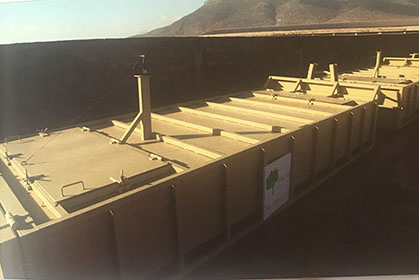
Composting is the process of modifying organic residues into biologically stable humic compounds, to create an excellent soil improver/conditioner for crop production.
Solid waste from the food industry is heterogeneous in both form and composition. This heterogeneity also determines the different method of treatment, in order to achieve their environmentally friendly disposal.
The efficiency of the treatment depends on the technologies used in order to:
1. Separate useful materials that can be recycled as raw materials in production processes, such as metals, paper, plastic and glass.
2. Protect the environment by preventing landfill disposal or incineration, which contaminate the atmosphere with methane and the soil with heavy metals.
3. Utilize the energy content in the production of fertilizer through aerobic biological decomposition.
Solid waste from the food industry is heterogeneous in both form and composition. This heterogeneity also determines the different method of treatment, in order to achieve their environmentally friendly disposal.
The efficiency of the treatment depends on the technologies used in order to:
1. Separate useful materials that can be recycled as raw materials in production processes, such as metals, paper, plastic and glass.
2. Protect the environment by preventing landfill disposal or incineration, which contaminate the atmosphere with methane and the soil with heavy metals.
3. Utilize the energy content in the production of fertilizer through aerobic biological decomposition.
Aerobic composting indoors
ΗCompost production in an indoor area allows for the biological processes and interventions performed during composting to remain unaffected by external conditions. The usual method of compost production outdoors makes it impossible to monitor and influence the production process. The different conditions during the winter and summer months affect the process.
Compared to the open, closed factories allow for:
- The measurements in the produced gases that diffuse into the environment (CO2, H2S, N-NH3)
- The control of humidity and avoidance of anaerobic phenomena which attract rodents and insects.
- The proper sanitation of the product, as it is protected from seeds and pathogenic microorganisms in the environment, which may adhere to the end of processing or to the maturation of the compost.
- The creation of a standard product on a timeless basis.
ΗCompost production in an indoor area allows for the biological processes and interventions performed during composting to remain unaffected by external conditions. The usual method of compost production outdoors makes it impossible to monitor and influence the production process. The different conditions during the winter and summer months affect the process.
Compared to the open, closed factories allow for:
- The measurements in the produced gases that diffuse into the environment (CO2, H2S, N-NH3)
- The control of humidity and avoidance of anaerobic phenomena which attract rodents and insects.
- The proper sanitation of the product, as it is protected from seeds and pathogenic microorganisms in the environment, which may adhere to the end of processing or to the maturation of the compost.
- The creation of a standard product on a timeless basis.
